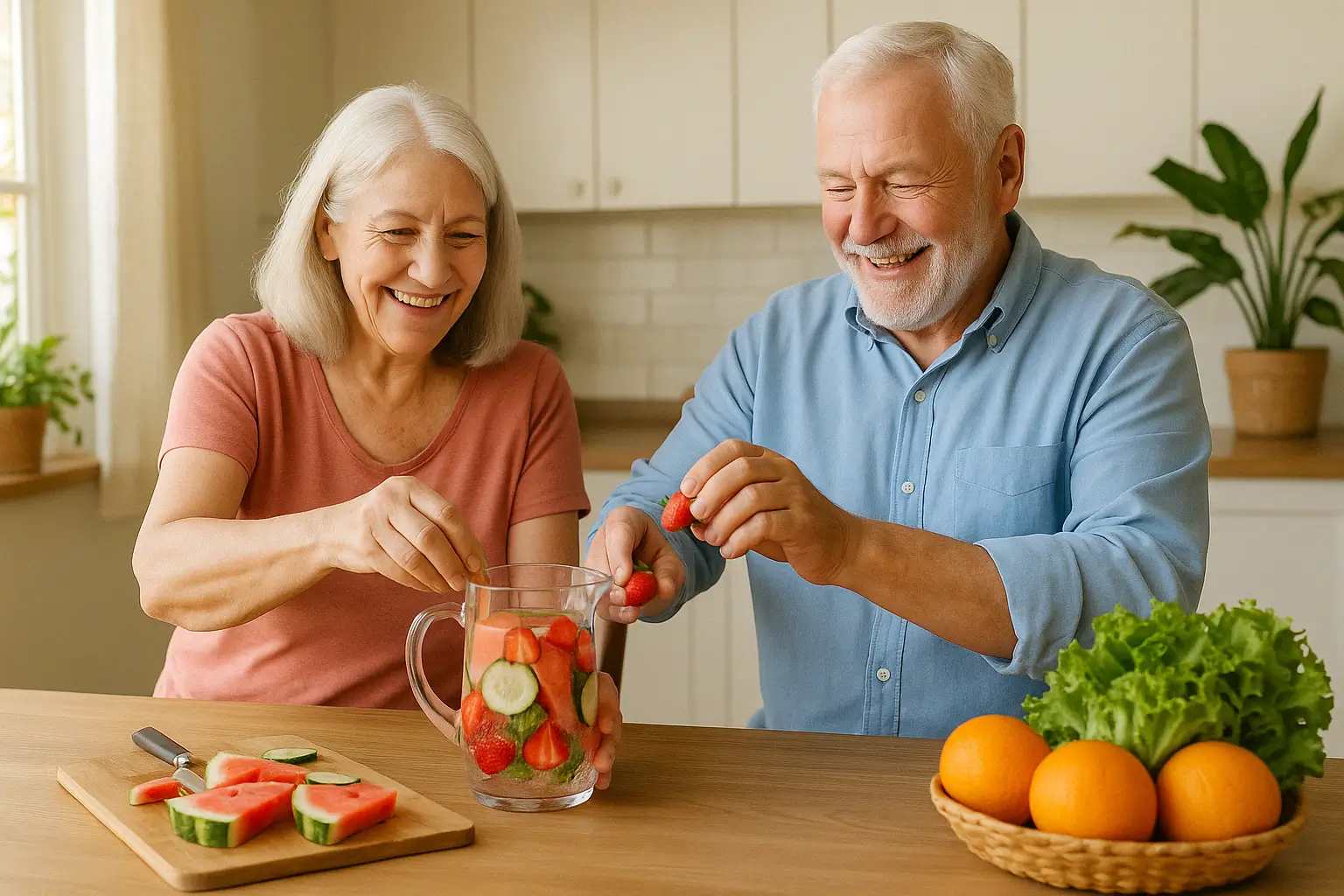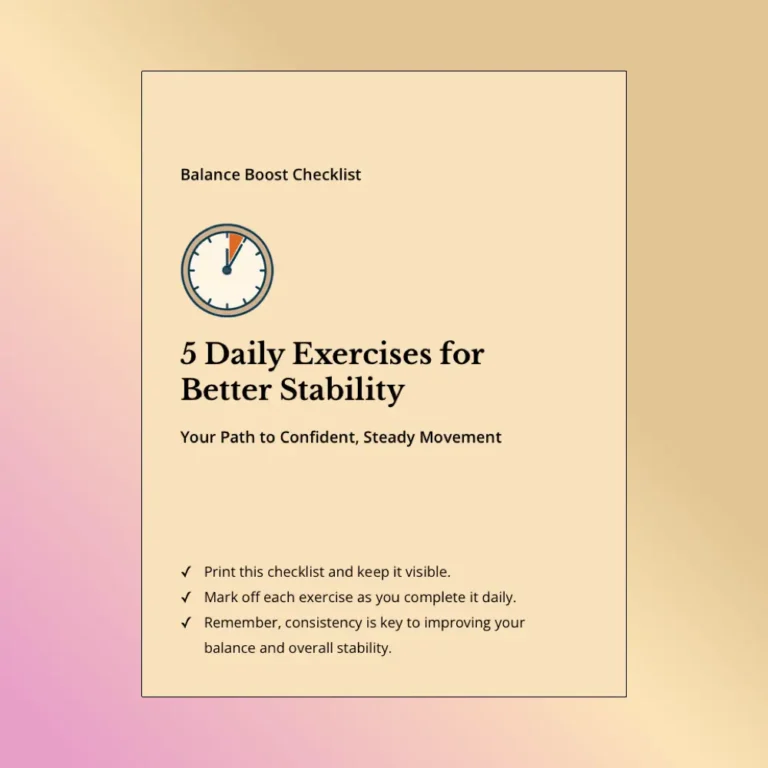As we get older, keeping our bodies properly hydrated becomes increasingly important. For seniors and older adults, good hydration isn’t just about quenching thirst; it directly impacts physical health and mental sharpness. This guide covers everything older adults need to know about staying hydrated, from daily water intake to recognizing dehydration symptoms.
Understanding Water Needs for Older Adults
Why Seniors Face Higher Risk for Dehydration
Getting older brings numerous physical changes that increase risk of dehydration. Many seniors experience:
- Reduced Body Water: Aging naturally decreases muscle mass and overall water content, making dehydration happen more quickly. Older adults have less water in their bodies compared to younger adults.
- Weaker Thirst Signals: The body’s natural thirst mechanism becomes less effective with age. Many seniors simply don’t feel thirsty even when they need water, making it hard to spot dehydration early.
- Health Conditions and Medications: Common senior health challenges and the medications that treat them can increase fluid loss or reduce thirst awareness. Diabetes and heart conditions are particularly linked to hydration challenges, making older people more susceptible to dehydration.
Mrs. Johnson, 78, shared her experience: “I never feel particularly thirsty anymore. My doctor explained I need to drink water throughout the day regardless of whether I feel I need it.”
How Much Water Should Seniors Drink Daily?
General recommendations suggest:
- Men: About 13 cups (3.1 liters) of fluids daily
- Women: About 9 cups (2.1 liters) of fluids daily
However, personal needs vary based on:
- Your Weight: Some experts recommend you take your weight and drink that number of ounces of water daily
- Weather and Activity: Hot temperatures and physical activity increase fluid needs
- Health Situation: Some medical conditions might require adjusting fluid intake up or down
Dr. Williams, a geriatric specialist, notes: “There’s no one-size-fits-all recommendation. Some seniors need more water than others depending on their activity level, medications, and overall health. The best way to prevent dehydration is to build hydration into your routine.”
Foods and Drinks That Help With Hydration
Water-Rich Foods to Include in Your Diet
Many foods contain significant water and can contribute to your daily fluid intake:
- Watermelon: Contains about 92% water and plenty of nutrients, with high water content
- Cucumbers: Made up of approximately 95% water with a refreshing crunch
- Strawberries: Sweet treats that provide hydration and antioxidants
- Lettuce: Leafy greens contain high water content plus valuable nutrients
- Soups and Broths: Warm, comforting options that hydrate while satisfying hunger
Creative Ways to Eat More Hydrating Foods
- Make fruit smoothies: Blend watermelon, strawberries and yogurt for a hydrating snack
- Create refreshing salads: Combine cucumbers, lettuce, and berries for meals that hydrate
- Use broths in cooking: Chicken or vegetable broth adds flavor while increasing fluid intake
Proper hydration and nutrition go hand in hand for older adults. When seniors don’t drink enough water, incorporating more water-rich foods can help them stay healthy.
Best Drink Choices for Seniors
While water should be your main hydration source, these beverages can help:
- Herbal Teas: Enjoyable hot or cold and caffeine-free
- Diluted Fruit Juices: Look for 100% juice and consider mixing with water or other fluids to reduce sugar
- Milk: Provides hydration plus calcium and protein
Drinks That Can Dehydrate You
Some beverages can actually work against your hydration goals:
- Coffee and Black Tea: The caffeine can act as a diuretic, causing you to lose more water
- Alcoholic Drinks: Can significantly dehydrate the body and should be limited
“I keep a glass of water with lemon slices in my refrigerator,” says Robert, 82. “Having something ready to pour makes me drink more water throughout the day.”
How to Recognize Dehydration
Common Signs of Dehydration
Knowing dehydration symptoms helps seniors take action quickly. Watch for the following symptoms:
- Dry Mouth and Increased Thirst: Early indicators your body doesn’t have enough fluid
- Feeling Tired or Dizzy: Dehydration often causes fatigue and lightheadedness
- Dark Yellow Urine: Well-hydrated individuals have lighter-colored urine
- Urinating Less Often: Decreased bathroom trips can signal dehydration
Mild dehydration can cause these symptoms, but severe dehydration requires immediate medical attention. Older adults participating in activities for seniors in nursing homes should be particularly careful to stay hydrated during physical activities.
Health Risks of Not Drinking Enough
Dehydration can lead to serious health problems:
- Constipation: Insufficient fluids make bowel movements difficult
- Kidney Issues: Prolonged dehydration can harm kidney function
- Mental Confusion: Research shows dehydration can cause cognitive issues in older adults
- Serious Complications: Severe cases may require hospitalization
A nursing supervisor at Sunny Hills Senior Living observes, “We often see confusion in residents that improves dramatically once we help them drink enough water throughout the day.”
Practical Tips for Staying Hydrated
Daily Strategies That Work
Try these approaches to maintain good hydration:
- Sip Throughout the Day: Instead of large amounts at once, take small, frequent drinks
- Keep Water Within Reach: Place water bottles or cups in rooms you spend time in
- Use Reminders: Set phone alarms or put notes on the refrigerator
These practical tips can help older adults prevent dehydration and ensure they get enough fluid daily.
Making Water More Appealing
Many seniors don’t drink enough because they find plain water boring. These tips to make hydration more enjoyable:
- Add Natural Flavors: Put sliced fruits or cucumber in your water
- Try Sparkling Water: The bubbles can make drinking water more interesting
James, 75, shares: “I wasn’t drinking enough until my daughter got me a reusable water bottle with time markers. Now I challenge myself to reach each mark by the time shown.”
Special Considerations for Health Conditions
How Medications Affect Hydration
Some common medications increase risk for dehydration:
- Water Pills (Diuretics): Often prescribed for high blood pressure and heart conditions, they lead to dehydration
- Some Antidepressants: Can cause dry mouth and increased thirst
- Talk With Your Doctor: Always discuss hydration needs with healthcare providers when starting new medications
Hydration Needs With Chronic Health Issues
Certain health conditions require special attention to fluid intake:
- Heart Failure: May require limiting fluids; follow medical guidance closely
- Kidney Disease: Often needs careful monitoring of both fluid type and amount
“Patients with heart failure need to track both their fluid intake and weight daily,” explains cardiologist Dr. Martinez. “Too much or too little water can cause problems.”
Older adults with mobility issues should also consider using a fall risk assessment tool as dehydration can lead to dizziness and increase fall risks.
Practical Tips for Family Caregivers
Helping older loved ones stay hydrated takes creativity and persistence:
- Make hydration a social activity: Sit down together for tea or water breaks
- Offer favorite beverages: Work with preferences rather than focusing only on water
- Use cups that are easy to hold: Arthritis can make drinking difficult with certain containers
“Dad never remembered to drink enough water,” says Jennifer, who provides home care for her 84-year-old father. “We solved this by setting up ‘hydration stations’ around his house with small cups of water or herbal tea that he can easily grab.”
Seasonal Hydration Adjustments
Summer Hydration Needs
Hot weather increases risk of dehydration:
- Increase fluid intake: Aim to drink at least 1-2 extra cups daily during heat waves
- Limit outdoor activity: Schedule walks and gardening for cooler morning hours
- Watch for heat exhaustion signs: Headache, nausea, and excessive sweating require immediate attention
It’s important to stay hydrated during summer months as seniors can lose more water through sweating.
Winter Hydration Challenges
Cold weather brings different hydration issues:
- Indoor heating dries the air: Consider a humidifier to reduce moisture loss
- Stay warm with hydrating hot drinks: Broths and herbal teas provide warmth and fluids
- Remember you still need water: Even when it’s cold, your body requires regular hydration
Among older adults in care homes, winter dehydration is common but preventable with proper fluid intake.
Conclusion
Proper hydration plays a crucial role in senior health and wellbeing. By understanding your body’s changing needs, recognizing signs of dehydration, and incorporating water-rich foods and beverages into your diet, older adults can maintain healthy hydration levels as they age.
Small, consistent steps make the biggest difference. Begin by placing a glass of water beside your bed each night, setting gentle reminders throughout your day, or adding sliced fruit to your water for flavor. Aim to drink 8-ounce glasses of water spread throughout the day.
Remember, good hydration supports better physical health, sharper thinking, and greater independence, all key components of enjoying your senior years to the fullest. Check with your healthcare provider about your specific hydration needs, especially if you manage chronic health conditions or take medications that affect fluid balance.
Hydration is important for overall health, and these tips to prevent dehydration can help seniors make sure they get enough water each day. What simple step will you take today to improve your hydration habits?


